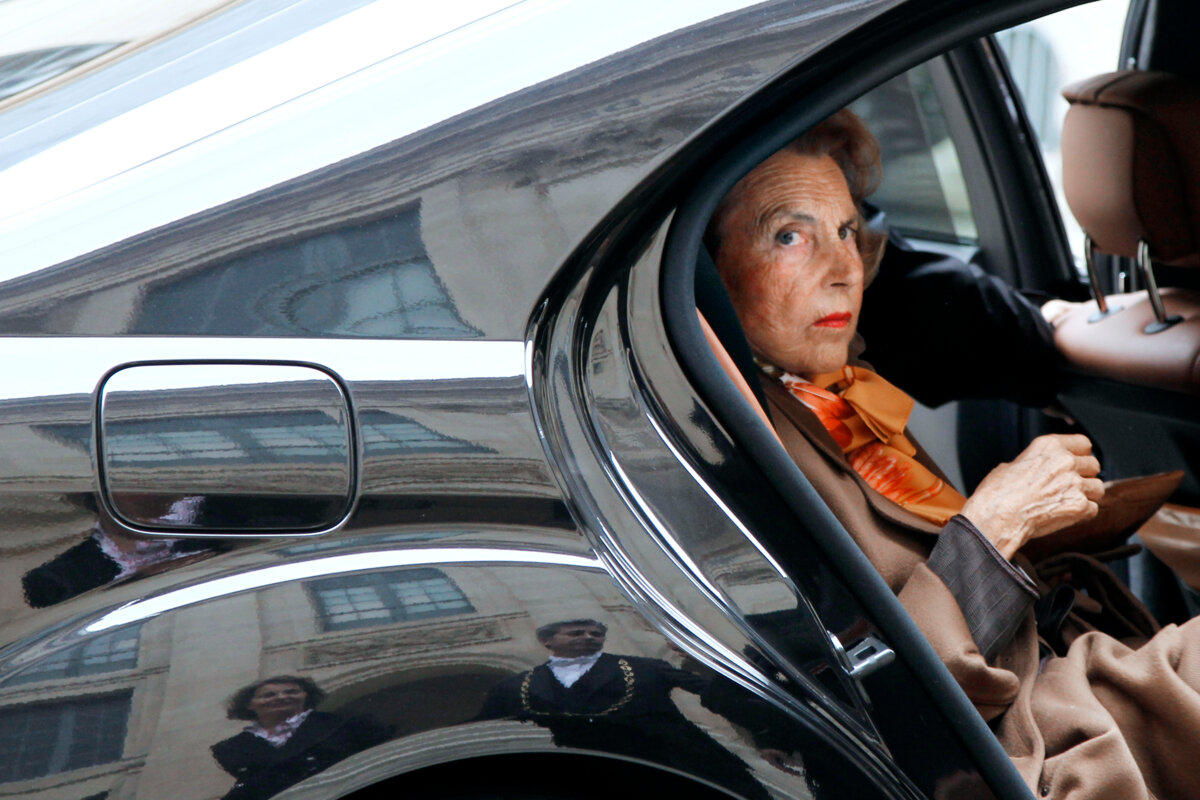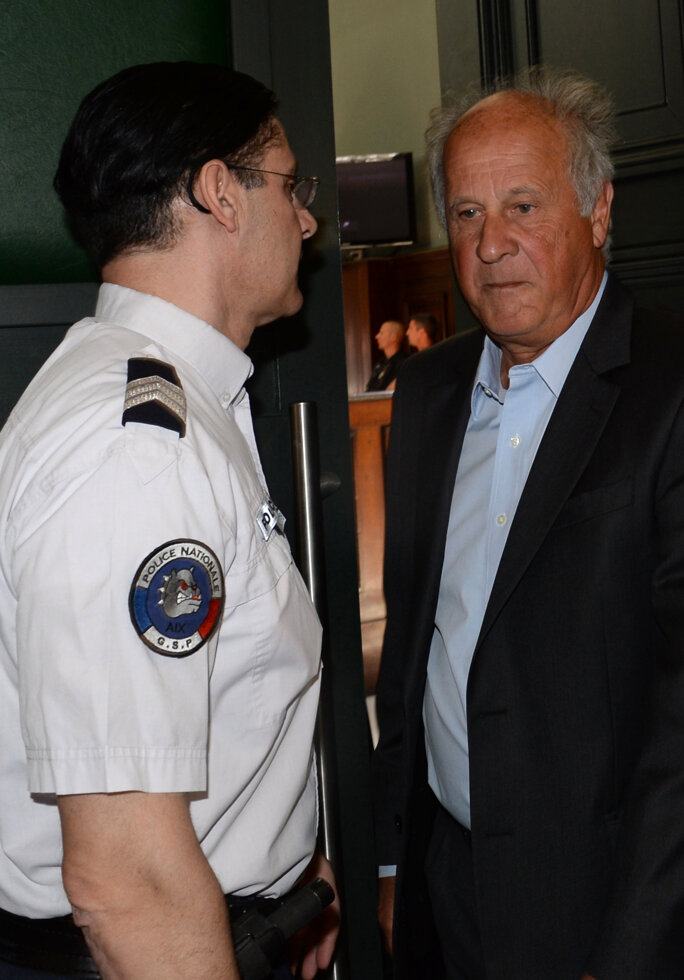A ten-year legal battle led by Mediapart and its lawyers on the sidelines of the so-called “Bettencourt affair” – the manipulation of the then elderly L’Oréal heiress Liliane Bettencourt by her close entourage – has reached a conclusion before the European Court of Human Rights in what represents a major defeat for the right to inform.
In a ruling published on January 14th on the court’s website, it found that France had not violated Article 10 – dedicated to freedom of expression – of the 1950 European Convention on Human Rights when it ordered Mediapart in 2013 to remove 70 articles which had been the departure point of revelations of the vast scandal of the Bettencourt affair.
The case before the European Court of Human Rights (ECHR), which had until then been heard in various French courts, concerned the publication of secret recordings made between May 2009 and May 2010 by Liliane Bettencourt’s major-domo of her conversations on business matters with her wealth manager, Patrice de Maistre. At the time, Bettencourt, who died in September 2017 aged 94, was the principal shareholder of L’Oréal, the cosmetics giant created by her father Eugène Schueller, and the richest woman in Europe.

Enlargement : Illustration 1

Bettencourt’s major-domo, Pascal Bonnefoy, had made the recordings in order to provide police with evidence that Bettencourt, whose mental and physical health had been in decline for several years, had fallen prey to numerous people among her close entourage seeking personal financial gain, beginning with her wealth manager. Since the end of 2017, and at the request of Bettencourt’s daughter and only child, Françoise, the police had been investigating the suspected manipulation of the frail billionaire – a crime of “abuse of frailty” under French law.
Mediapart received copies of the secretly recorded tapes, which totalled around 22 hours of disparate conversations, and proceeded to make a strict selection of those contents – after counter checks and to the exclusion of all which concerned matters of private life – which revealed issues of public interest. These included massive tax evasion by the Bettencourt couple, the conflicts of interest on the part of a then key government minister, Éric Woerth, the interference of the presidential office in particular judicial procedures, political funding and the future capital structure of L’Oréal, the world’s largest cosmetics group.
In the summer of 2010, Mediapart began publishing carefully chosen transcripts of the tapes. Subsequently, after mounting denials of their authenticity, Mediapart decided to make public some of the audio extracts.
Mediapart’s investigations notably revealed how Liliane Bettencourt, who held 12 secret foreign bank accounts, in Switzerland and Singapore, had hired for her private wealth investment office Clymène – at the request of Patrice de Maistre – the wife of budget minister Éric Woerth, whose ministerial administration had never carried out a tax inspection of Bettencourt’s affairs.
Woerth, who was also treasurer of the ruling UMP party and who had been treasurer of Nicolas Sarkozy’s 2007 presidential election campaign, personally awarded Patrice de Maistre with the Légion d’honneur – France’s highest honour for “eminent services” to the nation. Maistre, as also Liliane Bettencourt, had financially contributed to Sarkozy’s 2007 election campaign.
Mediapart’s revelations led to the resignation of Florence Woerth from her post at Clymène. In an interview days later with French daily Le Monde , she said, “I recognise that I underestimated this conflict of interests”. Meanwhile, Éric Woerth resigned as treasure of the UMP party (now renamed Les Républicains).

Enlargement : Illustration 2

At the end of one of the judicial investigations opened into the Bettencourt affair, Éric Woerth was sent for trial for “influence peddling”, but the court in Bordeaux would finally acquit him of the charge. Nicolas Sarkozy was placed under investigation on suspicion of unlawfully profiting financially from Liliane Bettencourt (“abuse of frailty”, “aggravated breach of trust” and “aggravated fraud”), but the case against him was eventually dismissed.
The revelations of the Bettencourt scandal prompted outrage among the then ruling conservatives, including the then secretary general of the UMP party, Xavier Bertrand, who denounced “the fascist methods” of Mediapart. On the legal front, some of the protagonists of the affair mounted a vigorous counter-attack.
The first of the summary proceedings to be launched under civil law were engaged by Patrice de Maistre and the then representatives of Liliane Bettencourt (a group close to Maistre), in which they demanded the removal of the sound and transcript extracts of the secret recordings, arguing that they were victims of a violation of privacy.
In a ruling on July 1st 2010, a Paris court dismissed the case they brought, underlining that Mediapart’s reporting was the “legitimate informing of the public” on “issues of public interest”. The magistrates noted: “To order the removal of documents that represent the publication of legitimate information and which concern the public interest would be to exercise a censorship that is contrary to public interest, except in the case of contesting the seriousness of the reproduction of the recordings which is not the case here.” That ruling was upheld on appeal a few days later, on July 30th.
But on October 6th 2011, France’s highest appeal court, the Cour de cassation, placed that legal interpretation in question and ordered the case to be studied by the Versailles appeal court. Contradicting the magistrates who until then had ruled on the case, the Cour de cassation considered that it was of little importance that Mediapart had engaged in a careful selection of the extracts from the tapes in order to publish only those of public interest. It found that because the recordings were of a secret nature this characterised a violation of privacy and their publication represented the proceeds of that violation.
Aligning itself with the interpretation of the Cour de cassation’s civil chamber, the Versailles appeal court sentenced Mediapart in 2013 to an unprecedented censorship; this was not only the removal of all the audio extracts from the recordings, but also the removal of all written extracts of the transcripts, failing which Mediapart would be fined 10,000 euros per day and per extract.
As a result, Mediapart was forced to de-publish 70 articles.
In solidarity with Mediapart, the NGO Reporters Without Borders, French news website Rue89, and the leading Belgian daily newspaper Le Soir, published the censored contents.
In the statement announcing its ruling last week, the ECHR said its presiding magistrates were “satisfied that the reasons relied upon were both relevant and sufficient to show that the interference complained of was ‘necessary in a democratic society’ and that the order in question had not gone beyond what was necessary to protect Ms Bettencourt and P.D.M. [Patrice de Maistre] from the interference with their right to respect for private life”.
From a legal point of view, the case heard in France was marked by a number of inconsistencies. The first of these was that Mediapart and journalists from French weekly Le Point (which had also received the contents of the recordings) were prosecuted under criminal law (under the criminal law code articles 226-1 and 226-2) for the same supposed offence. This resulted in acquittals, which were upheld on appeal, on the basis that Mediapart and Le Point had acted in the public interest by revealing the information.
The Bettencourt’s major-domo who recorded the conversations, Pascal Bonnefoy, was also prosecuted but was finally acquitted. The magistrates who heard the case ruled: “The action of Pascal Bonnefoy represents the conditions of a state of necessity, by safeguarding those interests of which the value is superior to that of the sacrificed interests: his act is therefore [of a] socially useful [nature] and society has no interest in punishing him, the sanction loses all social and personal usefulness.”
The second inconsistency was that the criminal chamber of the Cour de cassation (which is made up of different magistrates to those of the civil chamber) ruled that the secret recordings were valid as evidence for the judicial investigations into the Bettencourt affair. Indeed, they constituted key evidence that led to the conviction of Patrice de Maistre, who in 2015 was handed a 30-month jail sentence, a fine of 250,000 euros and ordered to pay Liliane Bettencourt damages of 12 million euros.
In a statement of case submitted by the French government to the ECHR in July 2017, it recognised that the articles published by Mediapart had “contributed to a debate of public interest” and that the censorship imposed on Mediapart by the Versailles appeal court constituted “an interference by the State in the exercise of [the] freedom of expression”. But it argued that this was justified by the violation of privacy to which, it claimed, Liliane Bettencourt and Patrice de Maistre fell victim to.
The French government document described Patrice de Maistre as having been a “collateral victim of the interest of the press in the patrimony of Mrs Bettencourt” – whereas the French justice system in fact recognised, thanks to the evidence of the secret tape recordings, that the same Patrice de Maistre had dispossessed Liliane Bettencourt of part of her wealth.
In the statement of case submitted to the ECHR by Mediapart’s lawyers, led by Jean-Pierre Mignard, they underlined that Patrice de Maistre “had not hesitated to seek refuge behind the principle of the protection of privacy, which is here corrupted, having constituted for him a shield for the offences that he committed against this elderly lady”.
The new guardians who were subsequently appointed to serve Liliane Bettencourt declared in court in 2015 that the actions of Mediapart had allowed the emergence of the truth of the scandal. “They did their job,” said Olivier Pelat, the billionaire’s legal guardian. “They permitted an abuse of frailty to end.”
But paradoxically, all the articles which were at the origins of the Bettencourt affair must now remain inaccessible to the public.
-------------------------
- The original French version of this article can be found here.
English version by Graham Tearse


